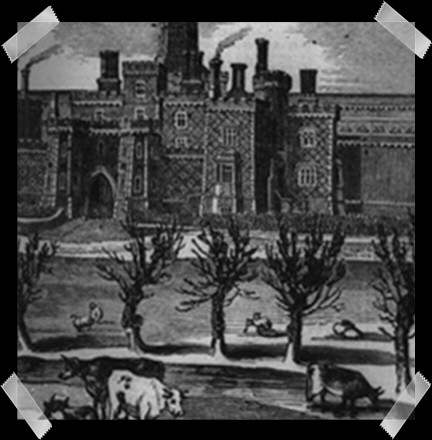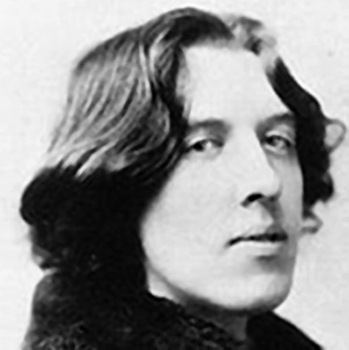
I.
Skarlát kabátját nem hordta
Mert keze is vörös volt,
Vér- s borfoltos, így találták,
S véle ott hevert a holt,
A szegény nő, kit szeretett,
S az ágyban meggyilkolt.
Ott vonult fegyencek között,
Elnyűtt, szürke ruhában,
Krikett sapka volt a fején
S lépdelt könnyed-vidáman,
De embert, ki ily vágyva néz,
Én biz’ sose láttam.
Nem láttam még ilyen szemet
Mely ily sóvár és tág,
Nézte azt a kis kék sátrat,
- Ott bent égnek hívták, -
Minden tovaúszó felhőt,
S rajtuk ezüst vitorlát.
Sétáltam én bús lelkekkel,
Hol börtönút kanyarog,
S gondolkoztam: mi volt bűne,
Kicsi, vagy komoly dolog?
És mögöttem így szólt egy hang:
Az a fickó lógni fog.
Krisztusom! Mintha a börtön
Forgott volna velem,
És az ég tüzes sisakként
Lángolt volna felettem;
S bár az én lelkem is sajgott,
Azt a kínt nem éreztem.
Akkor értettem csak meg, hogy
Mért ment oly gyors léptekkel,
S miért néz fel a tüzes égre
Oly vágyódó szemekkel;
Megölte azt, kit szeretett,
S néki is halni kell.
Ám minden férfi gyilkolt már,
Elmondom én, halljad hát!
Valaki egy pillantással,
Más szép szóval, ami bánt,
A csók a gyáva fegyvere,
A bátor kardot ránt!
Van, aki még ifjan gyilkol,
És más meg mikor agg,
Van, kinek a kéj a fegyver,
Másnak sok aranydarab,
Ám ki irgalmas, kést használ,
Mert úgy a leggyorsabb.
Lehet a láng nagy, vagy kicsi,
Ki adja, s veszi megint,
Van, ki könnyek közt teszi meg,
Míg más csak rálegyint,
Mert minden férfi gyilkolt már,
De mégsem hal meg mind.
Nem hal csúfos szégyenhalált,
A dicstelenség napján,
Kendő nem fedi a szemét,
S nincs hurok a nyakán,
Lyuk sem nyílik lába alatt,
Hogy elnyelje azután.
Néma strázsái nem néznek
Éjjel-nappal felé,
Kik lesik, hogy sír vagy imát
Mormol maga elé,
S őrzik, ki ne lopja magát,
Hisz’ ő a börtöné.
Nem kel hajnalban, hogy lássa,
Őérte jöttek-e,
Fehérruhás vacogó pap,
Bíró, csupa fekete,
És éjszín ruhás Igazgató,
Arcán sárga Végzete.
Nem pattan fel, nem kapkod, hogy
Rabruhája hol lehet,
Míg gúnyos orvos nézi azt,
Hogyan ráng az ideg,
Pörölycsapás minden hang, míg
Az órája ketyeg.
Nem ismeri azt a szomjat,
Mi torkát kaparja,
Mikor jön a kesztyűs hóhér,
S az ajtót kinyitja,
Megkötözi, s szomjat többé
Nem érez garatja.
Nem hajt fejet, hogy hallgassa,
Mit mond a gyászbeszéd,
S szűkölő lelke se súgja:
Nem halott, hisz’ mozog még,
Koporsót se pillant, amint
Az undok helyre lép.
Üvegtetőn át nem nézi
A messzi kék eget,
Nem mond imát száraz ajka,
Mi gyors végért eped,
És nem érzi, hogy Kajafás
Arcát csókolja meg.

Oscar Wilde: The ballad of the reading gaol
I.
He did not wear his scarlet coat,
For blood and wine are red,
And blood and wine were on his hands
When they found him with the dead,
The poor dead woman whom he loved,
And murdered in her bed.
He walked amongst the Trial Men
In a suit of shabby grey;
A cricket cap was on his head,
And his step seemed light and gay;
But I never saw a man who looked
So wistfully at the day.
I never saw a man who looked
With such a wistful eye
Upon that little tent of blue
Which prisoners call the sky,
And at every drifting cloud that went
With sails of silver by.
I walked, with other souls in pain,
Within another ring,
And was wondering if the man had done
A great or little thing,
When a voice behind me whispered low,
"That fellow's got to swing."
Dear Christ! the very prison walls
Suddenly seemed to reel,
And the sky above my head became
Like a casque of scorching steel;
And, though I was a soul in pain,
My pain I could not feel.
I only knew what hunted thought
Quickened his step, and why
He looked upon the garish day
With such a wistful eye;
The man had killed the thing he loved
And so he had to die.
Yet each man kills the thing he loves
By each let this be heard,
Some do it with a bitter look,
Some with a flattering word,
The coward does it with a kiss,
The brave man with a sword!
Some kill their love when they are young,
And some when they are old;
Some strangle with the hands of Lust,
Some with the hands of Gold:
The kindest use a knife, because
The dead so soon grow cold.
Some love too little, some too long,
Some sell, and others buy;
Some do the deed with many tears,
And some without a sigh:
For each man kills the thing he loves,
Yet each man does not die.
He does not die a death of shame
On a day of dark disgrace,
Nor have a noose about his neck,
Nor a cloth upon his face,
Nor drop feet foremost through the floor
Into an empty place
He does not sit with silent men
Who watch him night and day;
Who watch him when he tries to weep,
And when he tries to pray;
Who watch him lest himself should rob
The prison of its prey.
He does not wake at dawn to see
Dread figures throng his room,
The shivering Chaplain robed in white,
The Sheriff stern with gloom,
And the Governor all in shiny black,
With the yellow face of Doom.
He does not rise in piteous haste
To put on convict-clothes,
While some coarse-mouthed Doctor gloats, and notes
Each new and nerve-twitched pose,
Fingering a watch whose little ticks
Are like horrible hammer-blows.
He does not know that sickening thirst
That sands one's throat, before
The hangman with his gardener's gloves
Slips through the padded door,
And binds one with three leathern thongs,
That the throat may thirst no more.
He does not bend his head to hear
The Burial Office read,
Nor, while the terror of his soul
Tells him he is not dead,
Cross his own coffin, as he moves
Into the hideous shed.
He does not stare upon the air
Through a little roof of glass;
He does not pray with lips of clay
For his agony to pass;
Nor feel upon his shuddering cheek
The kiss of Caiaphas. |